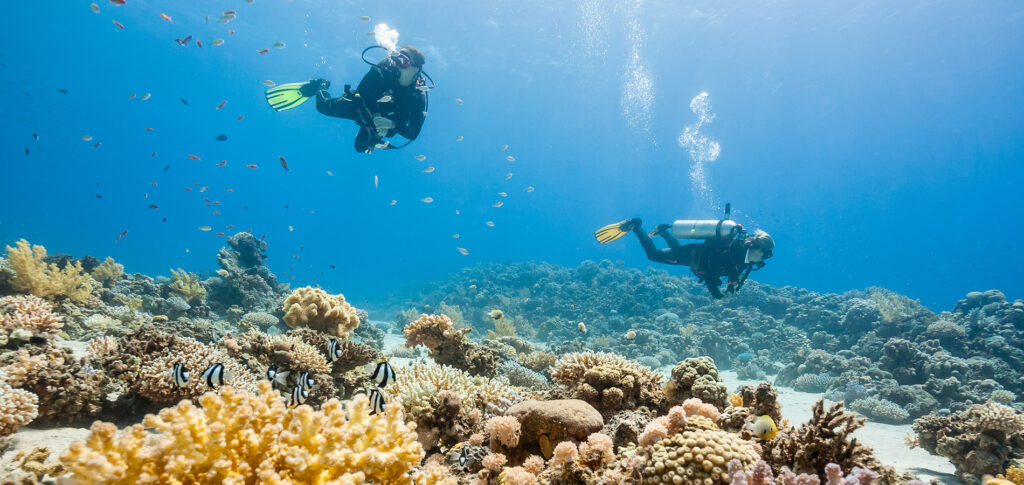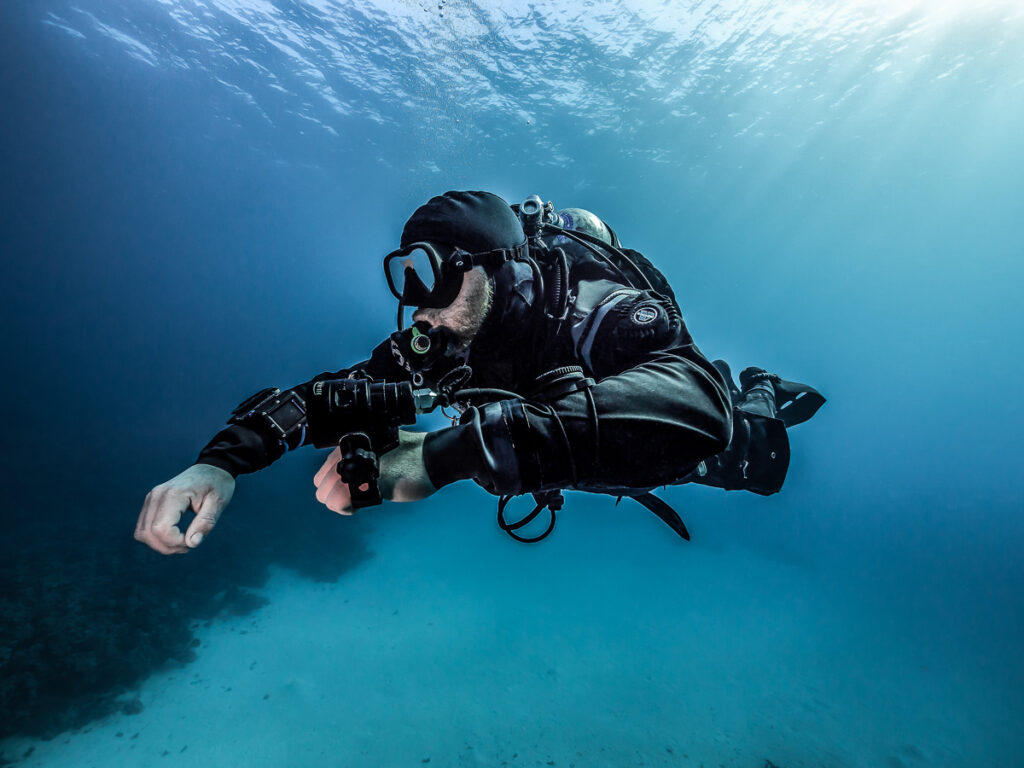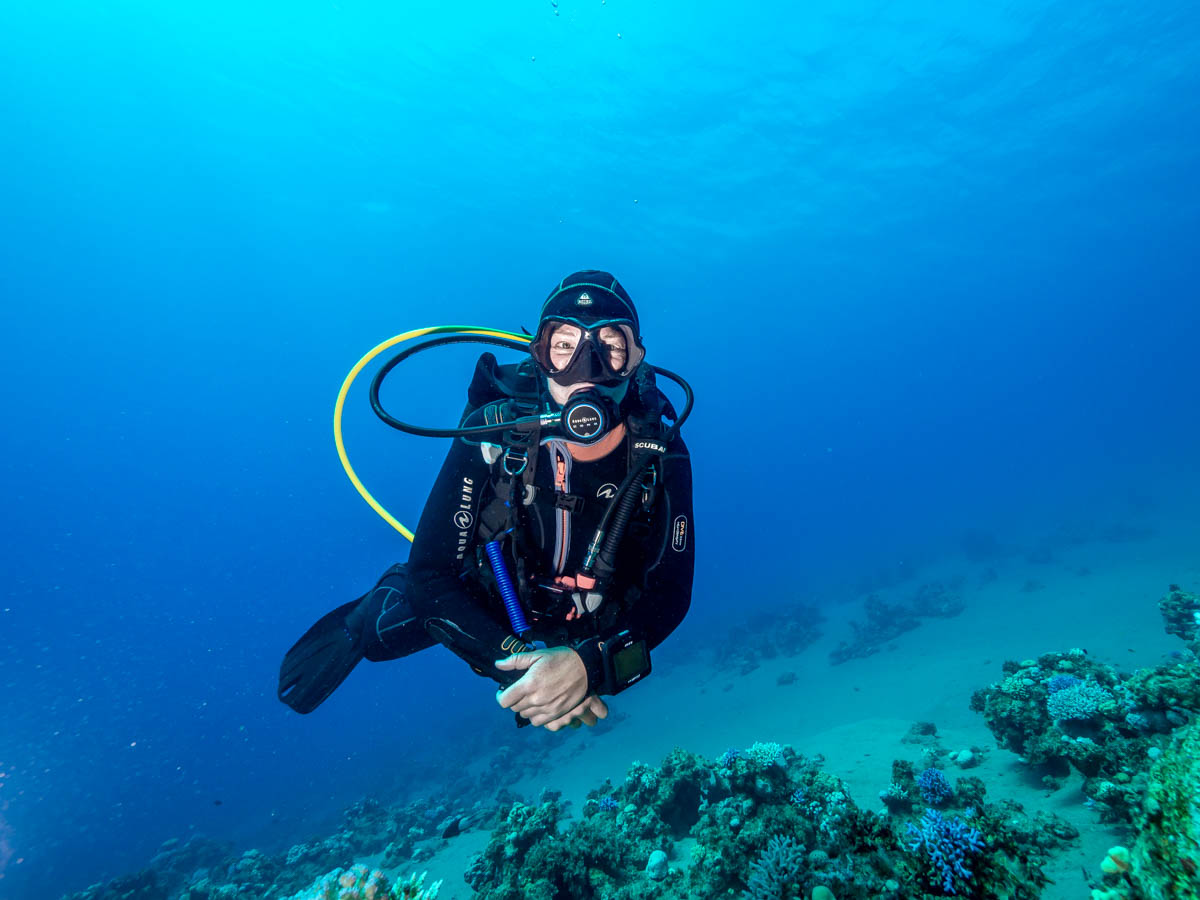Diving with the right partner is more fun! Here are 7 tips on how to become the best buddy!
Being a good dive buddy is one of the most important skills in diving. After all, your dive buddy can make the difference between the best and worst dive of your life!
But it is also a skill that is often neglected – especially by experienced divers.
In this article we present 7 tips that will make you the best dive buddy you can be.
How to be a better dive buddy, let’s dive in!
1. Communication
Just like in a marriage, communication is the key to a good buddy team.
Good communication starts on the surface. Here you can plan your dive, make your limits and expectations clear and also express your concerns. If the instructor has assigned you a new dive buddy, this is also a good time to get to know each other and assess your partner’s level of experience.
When you are underwater, it is important for a smooth dive that you maintain eye contact and communicate regularly with hand signals. Constant eye contact ensures that you and your dive buddy can communicate easily and quickly because you know exactly where your dive buddy is. You can also check that your dive buddy is comfortable and enjoying the dive as planned through regular communication with hand signals.
Good communication doesn’t end when you surface, but only after a thorough debriefing. Incorporating a debrief into your dive allows you to give and receive constructive feedback. This improves your team diving skills and makes you a better dive buddy and diver.
2. Plan your dive, dive your plan
Every dive needs a plan.
Whether it’s a 10-metre or 100-metre dive, a clear plan makes for a safer and more relaxed experience. When planning your dive, both you and your dive buddy are clear about expectations and limits – this avoids any confusion underwater.
Here are the most important factors to include in your dive plan:
- Ascending or reversing pressure
- Maximum dive time
- Maximum diving depth
- Decompression limits
- Navigation
- Emergencies
Once you and your partner have agreed on a plan, all you have to do is follow it. When you deviate from the plan, the problems start.
3. Honesty
In terms of dive planning, honesty is a key component in creating a successful dive plan.
It is helpful to voice any concerns you have about the dive. Whether you are uncomfortable diving as deep as planned or have little experience of wreck diving, you should make this clear so that the plan can be adjusted. This is also a courtesy to your dive buddy, so you don’t give them any surprises underwater!
You should also be open and realistic about your level of experience. Just because you have a lot of brevets doesn’t necessarily mean you have a lot of experience. And just because you’re an Open Water Diver doesn’t automatically mean you have little experience. If you are honest with yourself about your level of experience and communicate this to your dive buddy, you can avoid problems and create a better dive plan.
4. Read your buddy
The ability to read your dive buddy – or any other diver – is a skill you develop over time. Reading a diver is about recognising if their words match their behaviour and skills to prevent problems from escalating.
When you become a rescue diver, you learn to read the body language of other divers – in particular, you learn to recognise stress. This is an important skill, especially if you are diving with someone you don’t know.
Here are some common warning signs of stress to look out for:
- Boasting. If your new dive buddy brags about how many hundreds of dives they’ve done, how deep they’ve dived and what a hardcore diver they are in general, it’s often a sign of insecurity.
- Fundamental errors. If your dive buddy makes mistakes when setting up their equipment or forgets their equipment and/or basic safety procedures, this is another sign of potential stress – especially if that diver is not freshly qualified.
- Denial and defensiveness. Occasional irritation or denial of stress are often the clearest signs of stress!
- Silence and not talking. Passive stress is also a common feature in some people. This usually manifests itself through unusual quietness.
In any case, you want to create an open, safe environment where your dive buddy can voice their concerns.
5. Team positioning
Team positioning is designed to make life easier for you and your dive buddy, making the dive safer.
The first part of team positioning is to maintain the same depth as your dive buddy.
This way you can communicate easily and reach each other quickly in an emergency. This also means that your no-decompression limit is probably similar and you have a similar dive profile.

The second part is to maintain the same position relative to your dive buddy underwater.
For example, if you start the dive on your buddy’s right side, it is advisable to stay on that side for the rest of the dive. On the other hand, if you start on the right side, then move to the left, back to the right, then below and then above your dive buddy, it makes his life very frustrating as he never knows where you are. Of course, this can lead to problems in emergency situations. So, if possible, choose a side and stick with it!
Another important part of team positioning is maintaining eye contact during the ascent and descent. This is an aspect of diving that is often overlooked, even by experienced divers. By maintaining eye contact, you can better control the ascent and descent and react quickly to problems such as balancing difficulties.
6. Continuous training
Increasing your skills and knowledge is a good way to become a better diver.
If you’re already an Open Water Diver, then completing five SSI specialty courses and earning your Advanced Adventurer certification is a great way to improve your skills.
If you are already an advanced diver, then taking a stress and rescue course is another important step in improving your skills and becoming a good dive buddy.
Continuing your education is a proven way to improve your skills as a diver and dive buddy.
7. Take an SSI XR Foundations course

Speaking of continuing education: Taking a fundamentals course is one of the best ways to become a better diver – for any diver.
The SSI Extended Range Foundations course runs over two days and develops the core skills of diving – trim and buoyancy, propulsion techniques, team positioning and dive planning.
To enrol in this programme you only need to be 16 years old and have completed at least 24 dives.
So if you are interested in improving your diving skills, contact us and arrange your next diving course at Lagona Divers Technical!
And if you’re still not sure if this course is right for you, check out how you can benefit from a foundation course.


